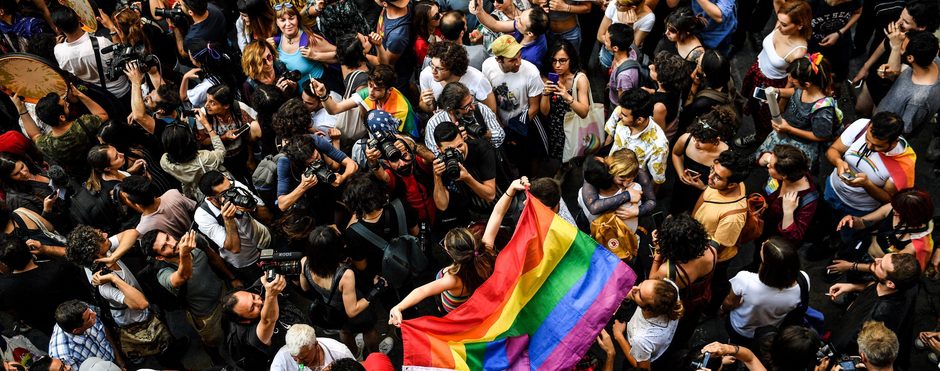There must be no repeat of the discrimination and violence meted out to Pride participants in Türkiye last year, said Amnesty International on the International Day Against Homophobia, Biphobia and Transphobia (IDAHOBIT).
Ahead of Pride season, new research by Amnesty International reveals how, in 2023, Turkish authorities imposed blanket bans and other discriminatory restrictions on Pride marches, using unnecessary and arbitrary force which in some cases amounted to torture. Anti-LGBTI rhetoric from senior government figures increased prejudice and emboldened anti-LGBTI groups.
Despite the restrictions and violence, LGBTI people and their allies across Türkiye are preparing to celebrate Pride and march peacefully against discrimination
Dinushika Dissanayake, Amnesty International
“As we approach Pride month there must be no repeat of the draconian restrictions, disproportionate violence and hateful official rhetoric that we witnessed last year,” said Amnesty International’s Deputy Regional Director for Europe, Dinushika Dissanayake.
“Instead, authorities should ensure LGBTI Pride marches in Türkiye go ahead safely and without the interference and intimidation of previous years.”
Discriminatory restrictions and abuse during Türkiye Prides analyses state responses to peaceful gatherings during the 2023 Pride season (7 June to 9 July). Authorities announced blanket bans on many marches and public events, and even without official bans, law enforcement officials prevented LGBTI people from peacefully gathering.
There was widespread use of unnecessary and arbitrary force against peaceful protesters resulting in at least 224 people being arbitrarily detained across the country. Those detained included lawyers, journalists, as well as people who were not participating in the Pride events. In some cases, unlawful force by law enforcement officers – including when they beat and kicked protestors – amounted to torture and other cruel, inhumane, or degrading treatment. The blanket bans, restrictions and violence had a severe chilling effect dissuading LGBTI people from participating in other peaceful protests.
Systematic bans on Pride marches must not be imposed this year and action must be urgently taken to tackle institutional homophobia and transphobia
Dinushika Dissanayake, Amnesty International
Politicians and high-level government officials have used increasingly discriminatory and stigmatizing rhetoric against LGBTI people. This escalated in the run up to last year’s elections with President Erdoğan himself saying in a televised broadcast that “LGBTI is a poison injected into the institution of the family”. In 2023, the government proposed an amendment to the Turkish Constitution to redefine ‘family’ as “the joining of a man with a woman”.
“Despite the restrictions and violence, LGBTI people and their allies across Türkiye are preparing to celebrate Pride and march peacefully against discrimination,” said Dinushika Dissanayake.
“Systematic bans on Pride marches must not be imposed this year and action must be urgently taken to tackle institutional homophobia and transphobia and ensure Constitutional and legal protections against discrimination of LGBTI people.”
Background
Amnesty International has launched a campaign calling on the Minister of Interior Ali Yerlikaya to ensure the authorities facilitate Pride marches and other events, in line with their international human rights obligations and as guaranteed under Türkiye’s Constitution.
States have a positive obligation to facilitate peaceful assemblies in law and in practice. As is the case in Turkish law, the exercise of the right to freedom of peaceful assembly is not subject to the authorization of government authorities.
Any decision to disperse an assembly should be taken only as a last resort and carefully in line with the principles of necessity and proportionality – that is only when there are no other means available to protect a legitimate aim which outweighs the right of people to assemble peacefully.
In any such situation, law enforcement officials must, as far as possible, avoid any use of force and, in any event, must always restrict it to the minimum level necessary.


